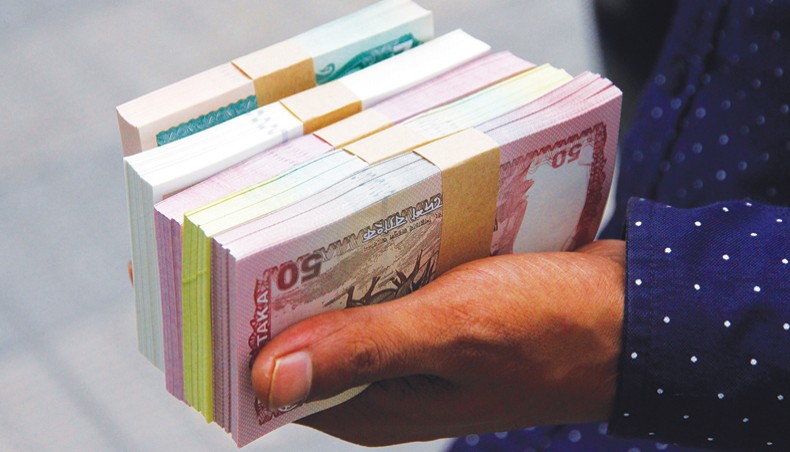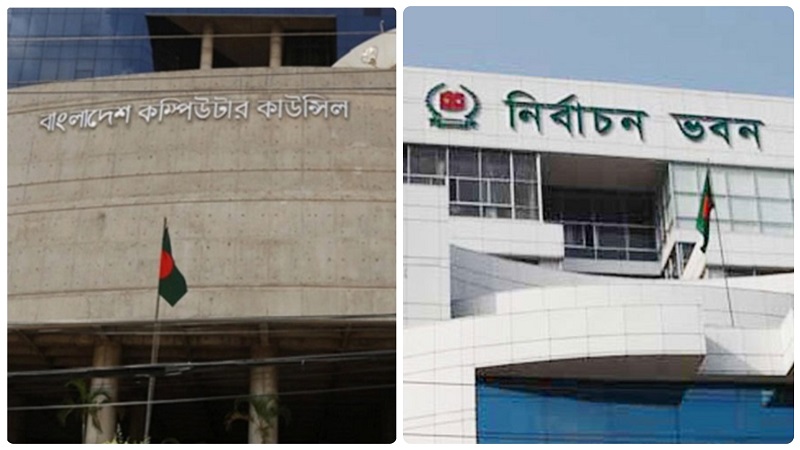The devaluation of the local currency against the US dollar has forced the government to count more Taka to repay debts to foreign creditors, creating pressure on revenue expenditures, economists and government officials said.
The Economic Relations Division officials calculated that the country had to pay around Tk 500 crore extra to meet the debt obligation in FY22, an eventful financial year marked by the war between Russia and Ukraine, the global price hike of fuel oils and an acute crisis of foreign currency at home.
The officials noted that extra local currency was required because of the appreciation of the dollar by more than 10 per cent against Taka in the financial year.
Although the price of dollars was stable in most parts of the year, it made a big jump at the tail end of FY22 amid higher imports and a lower inflow of remittance and export receipts.
In June, the final month of the financial year, the US dollar was traded at around Tk 92, up from Tk 84 to Tk 86 in earlier months.
Economists noted that the requirement for local currency would likely go up further in the current financial year to maintain the external debt repayment since there was no end to the upward rally of the dollar against the Taka in sight despite a series of measures taken by Bangladesh Bank.
The appreciation of the dollar against the Taka has been due to the weak monetary policy, said Policy Research Institute executive director Ahsan H Mansur.
On Wednesday, the dollar was trading at Tk 94.80 against Taka in the banking channel.
But the price of the dollar jumped to a new high of Tk 120 in the kerb market despite the Bangladesh Bank’s efforts to control the volatility in the price of the dollar.
On Monday, the Bangladesh Bank asked six major private banks to withdraw their treasury heads and punished 10 money exchange houses for irregularities in the trading of US dollars.
The BB has imposed several restrictions on imports of luxury and unnecessary goods since May as part of the government’s steps to save dollars amid depleting foreign currency reserves.
In less than a year, the country’s foreign exchange reserves fell from $48 billion to less than $40 billion, putting pressure on macroeconomic indicators like inflation.
In June and July, the monthly inflation rate was above 7 per cent, reaching a nine-year high as a result of rising prices for essential goods on the international market on the back of the war between Russia and Ukraine.
Ashan H Mansur criticised the central bank’s monetary policy of a 6 per cent interest rate on savings and a 9 per cent interest rate on lending.
He said that such a policy was not effective in tackling inflation.
The PRI executive director said that the annual average inflation rate of the country’s trading partners was much lower than Bangladesh’s over the years, and this had put extra pressure on the country’s fiscal measures.
Available data from the Economic Relations Division revealed that Tk 17,386.81 crore, equivalent to $2014.13 million, was required for the debt repayment in FY22.
In FY 21, the amount was Tk 16,238.89 crore, which was equivalent to $1914.13 million.
The ERD officials pointed out that the requirement for local currency was going up faster than that of the dollar.
The country’s overall external debt reached $60.15 billion in FY21, with an increase of $7.27 billion in each of the past three financial years.
The private debt of the country has also increased steadily to $18.69 billion, with a growth rate of 34.1 per cent between FY03 and FY12 and a growth rate of 77.9 per cent between FY12 and FY21.
The government’s debt includes many loans taken on short maturity periods.
Such loans will increase the debt obligation to foreign creditors at a fast rate, said former Bangladesh Bank chief economist MK Mujeri.
Economists have already warned that the country will no longer be in a comfort zone in terms of debt servicing from the financial year 2024-2025 as the grace periods of several foreign loans will expire by that time.
ERD projects that the country’s external debt repayment will be doubled at $4.02 billion in FY25 against $2.01 billion paid in FY22.
The external debt repayment will increase further from FY25 onward with the maturity period of the Rooppur Nuclear Power Plant, noted former World Bank Dhaka office lead economist Zahid Hussain.
The repayment of RNPP, being built with the single biggest loan of $11.38 billion from Russia at 4 per cent annual interest, will start in March 2027 at the end of a 10-year grace period.
Economists said that higher domestic revenue mobilisation was the most suitable option to meet the challenge of debt repayment in the near future.
Identifying the falling revenue as one of the reasons for the worst-ever economic crisis in neighbouring Sri Lanka, economists noted that Bangladesh’s revenue generation scenario was also not very encouraging.
Centre for Policy Dialogue distinguished fellow Debapriya Bhattacharya said that more revenue generation measures should be taken on an urgent basis to avoid possible debt distress.
He noted that the government failed to achieve its 7th Five-Year Plan Target Tax-GDP ratio of 14.1 per cent by 2020.
The country’s Tax-GDP ratio was 9 per cent in FY22.
A comparative analysis of revenue collection in per cent of GDP in the past five years by the finance division in its ‘Medium Term Macroeconomic Policy Statement FY23-FY25’ showed a slower performance by Bangladesh.
The analysis showed that Nepal’s average revenue–GDP ratio of 22.36 per cent is more than twice that of 10.01 per cent in Bangladesh. Laos’ ratio is one-and-a-half times more, at 14.84 per cent. In 2021, Cambodia’s revenue-to-GDP ratio was 23.99 per cent.
Laos and Nepal will graduate from the LDC category along with Bangladesh.
The policy statement said that the absence of sufficient revenue collection would hinder the country’s desired public investment level ahead of its graduation from the least developed country in 2026.













